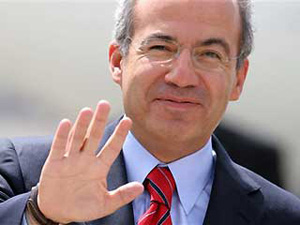 |
 |
 |
 Editorials | Opinions | December 2007 Editorials | Opinions | December 2007  
Mexico Welcomes Returning Migrants
 Maria Elena Salinas - Arizona Daily Star Maria Elena Salinas - Arizona Daily Star
go to original


| | Mexican President Felipe Calderon went to the border city of Tijuana, the busiest port of entry along the Mexico-U.S. border, to greet his paisanos. |
As usual during this time of year, more than a million Mexican immigrants are expected to cross the border to spend the holiday season with their loved ones. But this time around, there is an added element to their journey: Many of them could end up making a one-way trip back home.

Mexican immigrants are finding it increasingly difficult to live in the United States. The land of opportunity that once embraced their work ethic and unique abilities is becoming, to many, a land of misfortune and rejection. A country that appreciated and took advantage of their hard labor is now telling them they are not welcome anymore.

For many immigrants, coming to this country is a once-in-a-lifetime chance to work and help support their families back home. Some of them have established roots here. They've gotten married, had children; they have become an integral part of their communities and parishes. Others, however, just planned to save enough money to go back home and build a better future for themselves and their families. For those, maybe that time has come.

There are no exact figures, but stories abound of immigrants who have decided not to return to the United States after their holiday vacation south of the border. It's just not the same here anymore. Hate crimes have increased. Discrimination and racial profiling are on the rise as a result of the hostile environment toward illegal immigrants. Immigration raids and random collateral arrests have people living in fear. Many parents are afraid to take their children to school, not knowing if they will be picked up and separated from their family, even if the kids are U.S. citizens.

For those who are returning, whether as a result of deportation or voluntary repatriation, the Mexican government is preparing to welcome them back home. On Dec. 18, Mexican President Felipe Calderon went to the border city of Tijuana, the busiest port of entry along the Mexico-U.S. border, to greet his paisanos.

It was a symbolic gesture that coincided with International Migrants Day, as declared in 2000 by the United Nations. On that very day 10 years earlier, the U.N. adopted the International Convention on the Protection of the Rights of all Migrant Workers and Members of Their Families. The document is a reminder that all human beings are born free and should be treated equally and with dignity, regardless of their race, color or nationality.

Calderon, who has been very outspoken about what he has called the anti-Mexican approach in the political campaigns, once again came out in defense of his compatriots. He denied that Mexican workers represent a social, economic or even security problem for the United States.

"Those who attempt to present Mexican migrant workers as enemies of the United States, be it as a result of ignorance, ill intention, political or economic interests, are mistaken," he said.

Adding that Mexican workers actually benefit the U.S. economy by generating an annual income of some $30 billion, Calderon warned that the ill treatment of Mexican immigrants not only generates unnecessary tension in bilateral relations, but also "weakens the development of all of North America."

The Mexican president took advantage of his own trip to the border to announce the implementation of a new government program. Humane repatriation will provide food, shelter, medical assistance and temporary work for those who are deported each year. The program is to officially start in 2009 but will work as a pilot program in 2008.

After one of the most hostile years for immigrants living in the U.S., being welcomed home with open arms could make this year's holiday season a true Feliz Navidad.

Contact Maria Elena Salinas through the "Guest Book" on her Web site: www.mariaesalinas.com. | 
 | |
 |



